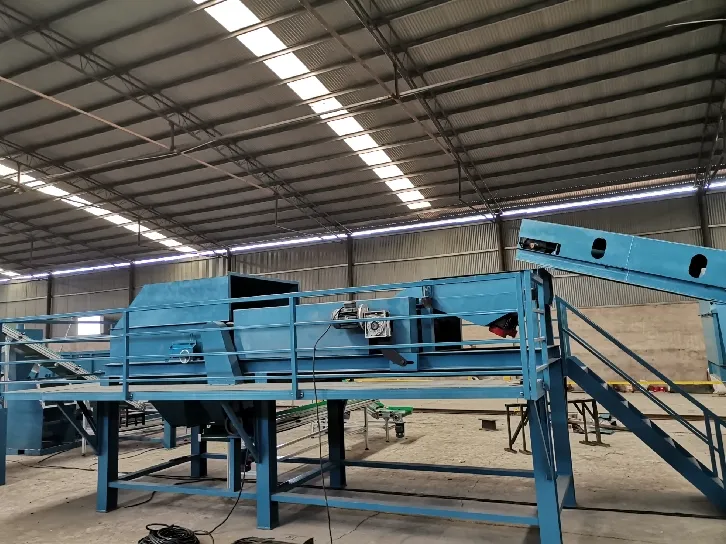
12 月 . 04, 2024 09:37 Back to list
The Importance of Scrap Metal Recycling Plants
In an era of increasing environmental awareness, the significance of recycling has taken center stage in discussions about sustainability and resource management. Among various recycling initiatives, scrap metal recycling plants play a crucial role in conserving resources, reducing pollution, and fostering economic growth.
Understanding Scrap Metal Recycling
Scrap metal refers to any metal that is no longer in use or is deemed waste. This can include everything from old cars and appliances to discarded industrial machinery. The process of recycling scrap metal involves collecting, processing, and repurposing these metals to create new products. This not only mitigates the need for virgin materials, which can lead to habitat destruction and increased energy consumption, but it also minimizes landfill waste.
Environmental Benefits
One of the primary advantages of scrap metal recycling plants is their positive impact on the environment. First and foremost, recycling metal conserves natural resources. For example, recycling aluminum saves up to 95% of the energy needed to produce new aluminum from raw bauxite ore. Furthermore, the extraction and processing of raw metals often lead to significant environmental degradation, including soil and water contamination. By recycling metals, we can significantly reduce pollution levels and lower our carbon footprint.
Additionally, recycling metal significantly decreases greenhouse gas emissions. According to the Environmental Protection Agency (EPA), recycling and composting prevented the release of over 186 million metric tons of carbon dioxide equivalent into the air in 2018 alone. With scrap metal recycling, industries can utilize this as a means to offset emissions generated during production processes, thus contributing to broader efforts in combating climate change.
Economic Impact
Scrap metal recycling is not just environmentally beneficial; it is also economically advantageous. Recycling plants create jobs at various levels, from collection and transportation to processing and distribution. The scrap metal recycling industry supports thousands of jobs globally and is an essential component of the economy in many regions.

Moreover, the practice of recycling metals reduces manufacturing costs for industries. This is primarily because recycled metal is often cheaper than new metal, leading to reduced prices for consumers and increased competitiveness for businesses. By fostering a circular economy, where materials are continually reused and repurposed, we can stimulate economic growth while also promoting sustainability.
The Process of Scrap Metal Recycling
The journey of scrap metal from waste to new products involves several steps. Initially, scrap metal is collected from various sources, including construction sites, automobile salvage yards, and industrial facilities. The collected metal is then transported to recycling plants, where it undergoes sorting, cleaning, and processing.
In the recycling plant, metals are separated based on their type—ferrous, like iron and steel, and non-ferrous, like aluminum and copper. Once sorted, the metals are cleaned to remove any contaminants, then shredded into smaller pieces to facilitate melting. The shredded metals are melted down in high-temperature furnaces and, after being purified, cast into new forms for manufacturing.
Challenges and the Future of Scrap Metal Recycling
While scrap metal recycling has numerous benefits, it does face challenges. Fluctuating market prices for metals, changes in regulations, and the complexity of separating mixed materials can hinder the efficiency of recycling processes. Moreover, public awareness and participation in recycling programs remain crucial for maximizing success.
To address these challenges, the industry continues to innovate. Emerging technologies, such as artificial intelligence and advanced sorting systems, can enhance the efficiency of recycling operations. Additionally, public education campaigns can raise awareness about the importance of recycling and how individuals can contribute to the movement.
Conclusion
Scrap metal recycling plants are vital to creating a sustainable future. By conserving natural resources, reducing pollution, and providing economic benefits, these plants contribute to environmental health and economic vitality. As we move toward a more sustainable world, the role of scrap metal recycling will only become more significant, urging society to embrace recycling as a core component of responsible consumption and production. The future of metal recycling is not just about reclaiming what's discarded; it's about shaping a healthier planet for generations to come.
Latest news
Unveiling the Power of Eddy Current Separator
NewsSep.25,2024
Transform Your Home Recyclin:home metal shredder
NewsSep.25,2024
The Future of Waste Management with Recycling Line Picker
NewsSep.25,2024
The Benefits of a Metal Recycling Plant
NewsSep.25,2024
Revolutionize Material Separation with Onwang Technology
NewsSep.25,2024
Innovative Waste Management: Unveiling the MSW Sorting Plant
NewsSep.25,2024